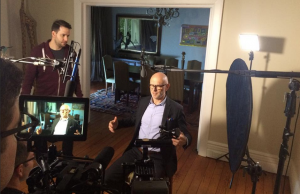A warts-and-all account of how Christianity has influenced the world is now in development from the Centre For Public Christianity.
Titled For The Love of God: How the church is better and worse than you ever imagined, the documentary is scheduled for completion in 2017 and executive director of Centre For Public Christianity (CPX), Simon Smart, is aiming high.
From addressing how Christianity has influenced wars and historical violence to highlighting the impact of Christian faith on scientific development and the western understanding of the individual, human rights, beauty and culture, the documentary will span the course of Christian history.
When history professor David Bebbington from The University of Stirling – widely recognised as an authority on religious history – visited the Centre For Public Christanity earlier this year, he confirmed something Simon and his colleagues had felt for a long time: “The primary question for people today, regarding Christianity, is not ‘Is it true?’ but ‘Is it good?’”
“We’ve moved through a period where many people thought Christianity is something they could safely ignore, to a point where a vocal and influential minority think it’s actually sinister, and something to be actively resisted,” said Simon.
One of the most frequent objections to Christianity is the faith’s violent past. Simon says many people point to the Crusades or the Inquisitions as examples of the terrible suffering Christianity has inflicted on the world.
“And these are, certainly, terrible things. In fact, the documentary might reveal some awful stories that people might not have even heard before. But there’s a need to untangle what happened in these wars, distinguishing between something that’s purely a result of faith itself and other more complicated factors. For example, the proximity to power that Christianity found itself in and the way that shaped the expression of faith, or the way Christianity got caught up in economic power or how faith was used as a kind of fuel for leaders whose goals were separate from anything that you could identify as key to the faith itself.”
CPX founder John Dickson will host the documentary, with Simon and senior research fellow Justine Toh. They’ll travel around the world to bring the documentary to life, from Spanish dungeons to talk about the Inquisitions to Israel to explore the question of Old Testament violence. They’ll also visit early Christian monasteries in Europe, to discover the earliest examples of caring for the poor, and ancient hospices where people ministered to the destitute and dying, and plenty of places in between.

Centre For Public Christianity has started filming for its new documentary ‘For The Love of God’
“We want to address the question of the impact of Christianity, not wanting to hide from the very real aspects of Christian history that are shameful and add weight to the criticism that religion can be a force for evil. We want to fully acknowledge the failures of Christianity in order to tell the good story. Because we believe the picture is overwhelmingly positive.”
The documentary will feature interviews with historians and theologians at the top of their fields, including Yale Divinity School professor Miroslav Volf – the documentary’s first interviewee while he was recently in Australia, on religion and violence.
“There’s a beautiful, largely untold, story for people today about the way in which Christianity has shaped many of the good things about our world, that demonstrate that Christianity has done a lot more good than harm,” said Simon.
“We think it’s worth people knowing the full story before writing it off. We want to acknowledge the criticisms that are valid, telling people something of the core of the faith and the vision that Christianity has laid out and the sometimes very inadequate, imperfect expression of that vision. That’s an important distinction to make.
“Ultimately, we want people to think again before they swallow the popular wisdom about the damage Christianity might have done and to have a more informed understanding of its contributions. Perhaps it will encourage them to think Christianity might be worth a second look.”
Email This Story
Why not send this to a friend?



